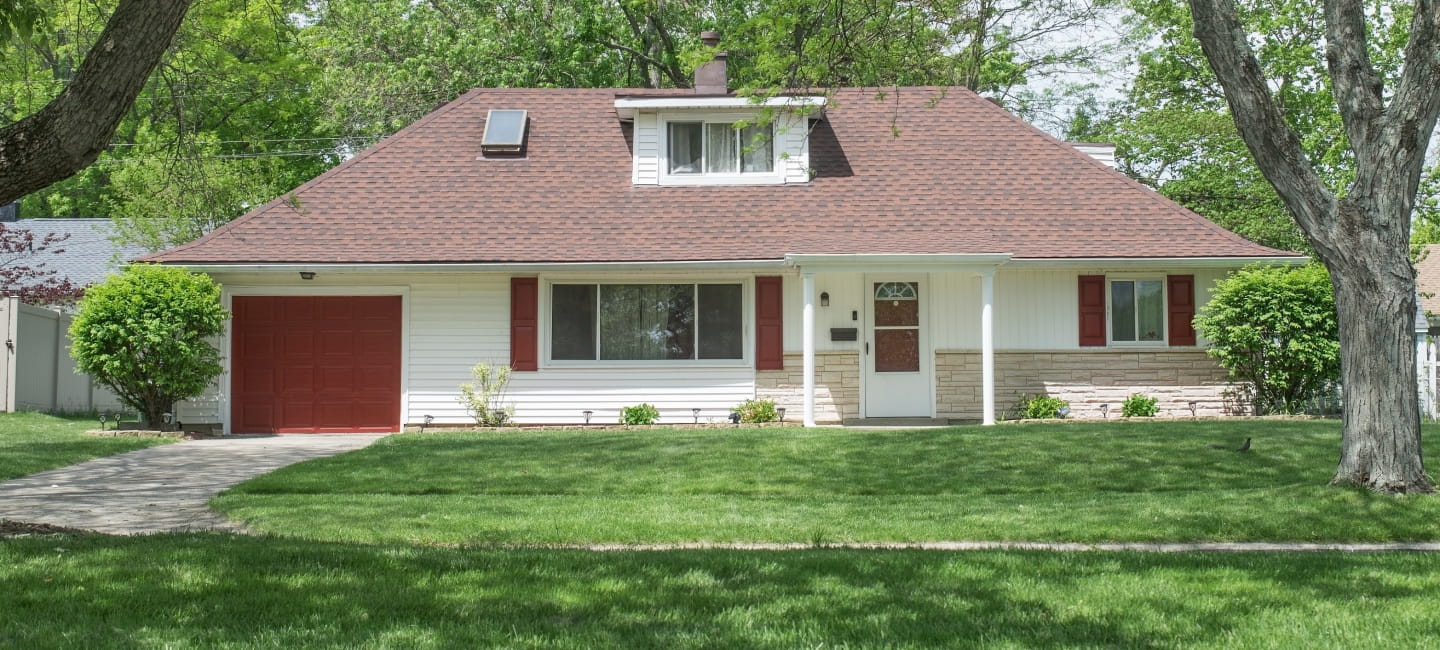

Downsizing your home is a substantial life decision, and there are numerous benefits of moving to a smaller property that extend beyond just saving on housing costs. In this article, we'll explore the reasons why downsizing is a choice worth considering, and why for some it might not be the right decision.
First off, let’s cover the reasons you might want to downsize.
There can be a number of reasons you might want to downsize to a smaller home. Moving to a smaller property can allow you to release equity through the sale of your current home. By selling your current home, you can pay off your mortgage debt. If you have enough money to buy your new home in full, you can then live mortgage-free which will considerably reduce your monthly expenses.
Moving to a smaller home will normally reduce other costs like your council tax bill and energy costs, as well as being easier to manage than a larger property.
Any money left over from the sale after you’ve bought your new home can be used to fund your retirement, travelling, buying another property or even helping a loved one get on the ladder themselves.
Although there are many benefits to downsizing, there are drawbacks to consider. The main one is losing space as well as amenities and a community that you’re used to. You may also be leaving the home you’ve lived in for a number of years and created wonderful memories in. However, moving to a smaller home is often more manageable than a larger property, and you can certainly find a home with all the space you need.
Before making a final decision, it’s worth getting expert advice. Experts like mortgage brokers, estate agents and wealth managers can help you work out if downsizing is the right course of action for you.
You may have to pay tax when you downsize if your new home is over the threshold for stamp duty. This is the tax you pay when you purchase any property costing £250,000 or more (unless you’re a first time buyer). The amount of stamp duty you pay depends on the portion of the property price that falls into each tax band - this is why it’s often easier to use a Stamp Duty calculator to work out what you’ll pay instead of working it out yourself!
Although not taxes, other costs to consider include lender and estate agent fees, conveyancing, property valuation and moving costs.
Normally, you don’t pay Capital Gains Tax when you sell your home to downsize to a smaller one. As long as you have lived in your current home as your main residence the entire time you’ve owned it, have never rented it out or used part of it for a business, and your land is smaller than 5,000 square metres or just over one acre, then you will not have to pay Capital Gains Tax when downsizing.
If you do have to pay Capital Gains Tax on your current property, the amount you pay will be based on your income. For basic rate taxpayers, you will be charged a rate of 18% on any gains, while for higher rate taxpayers you will be charged at 28%.
We'll let you know the amount of tax you'll be liable to pay, whether you’re a first-time buyer, moving home, or buying an additional property.
Your stamp duty will be:
The amount you pay is based on Stamp Duty bands. The tax is calculated on the part of the property price falling in each band.
If you are considering downsizing to release equity from your home, it might be worth considering other options before making a final decision. A common way to do this is through a lifetime mortgage. This is a type of later life lending that allows you to get a mortgage loan that’s secured on your home, allowing you to free up some of the wealth you have in the property. Lifetime mortgages do not need to be repaid until you die or go into long-term care.
Another option is to look at remortgaging your property to release money from your home. However, eligibility criteria may vary, and you might find that your pension or investment income isn’t sufficient alone to pass lender’s affordability tests. When you take out a mortgage, the loan is secured against your home and your home may be repossessed if you do not keep up your monthly payments.
If this is the case, it’s worth considering a Retirement-Interest-Only (RIO) mortgage instead. This is a type of mortgage that is available to homeowners over 55. It works by repaying the interest on the loan each month, but not the debt. This allows homeowners to borrow into retirement, while keeping the monthly mortgage costs low. There is also no end date to the mortgage - instead the debt is repaid from the sale of the house when the last surviving homeowner dies, or moves into long-term care.
Because you’re only paying the interest each month, this means the equity you hold in the home is protected. When the house is sold and the debt is settled, any remaining equity can be left behind as inheritance for your loved ones.
If your monthly costs are too expensive, another alternative to downsizing you could consider is to rent out a spare room to generate an additional income. This could be looking for a long-term lodger, offering your home to tourists through sites like AirBnb, or becoming a homestay host for international students, interns, professionals or long-term travellers.
Still want to downsize? Let’s run over the steps you need to take.
The first step in downsizing from your current home to a new one is to work out what budget you have to work with. Will the sale of your current home allow you to buy a new one outright, or will you need a mortgage? What are lenders likely to offer you for a mortgage loan, based on your age, earnings or pension income?
This is where working with a mortgage specialist like Saga Mortgages provided by Tembo can be helpful. Tembo are experts in boosting mortgage affordability and their award-winning team can help you find the right mortgage option for you.
A mortgage is a loan secured against your home. Your home may be repossessed if you do not keep up repayments on your mortgage.
As well as your budget, it’s worth working out at the start what downsizing will cost in terms of additional expenses. For example, you may have to pay lender or estate agent fees, stamp duty, as well as removals and moving costs.
Whether you go for a local estate agent or an online one, it’s worth researching different estate agents before choosing one to go with. Look at their reviews, as well as their fees before making the decision.
Need to know: Before your property can be listed, you will need to have an energy performance certificate (EPC), or have applied for one. An EPC is a standardised report which ranks your property in terms of energy efficiency, and is a legal requirement of all homesellers.
Before listing your property, do your research and get to know the local market. See what similar sized properties in the area sell for, and if there is anything you may need to do to your home to increase its value before listing.
Our guide on the Best Ways To Increase Your Home’s Value might be a useful starting point.
An estate agent can also do a valuation, but don’t necessarily go with the highest selling price they suggest. Be prepared for buyers to negotiate on price, they may place offers which are 5% to 10% below the asking price, which depending on the market you may have to accept.
If you aren’t buying your new home outright, then the next step is to get a Mortgage in Principle. This is a simple document that gives a realistic idea of what you can afford, and shows home sellers and estate agents that you are a serious buyer. You can get a Mortgage in Principle for free from a mortgage broker or lender, normally quite quickly.
Once you understand what your budget is and what you could be offered for a mortgage, you can start researching where you might want to buy, and organising house viewings. It’s important here to think about the type of property you need both for your current needs and those in the future.
For example, do you need a property to be all on one level? Do you need it to be close to a bus route so you can get around without using a car? Do you need nearby parks for walking your dog? These are all worth considering to ensure you choose a home that is right for you now, and in the future.
Once you’ve found a property you like, it’s time to make an offer. Remember that you don’t have to offer the asking price - it’s worth doing your research beforehand to see how long the property has been on the market, and what nearby properties have sold for.
However, before you can make an offer on a property you like, you will also need to have accepted an offer on your current property from a buyer. There can be back and forth between you and an interested buyer on price, but once you’ve reached an offer you’re happy with, make sure you communicate that you have formally accepted it.
Once your offer on your new home has been accepted, the next step is to apply for a mortgage. Contact your mortgage broker, and they’ll submit your application to your chosen lender. There may be some back and forth if the lender requires additional information, or comes back with questions, but otherwise the application should be quite straightforward!
Once you’ve appointed a solicitor for your home purchase, they’ll liaise with the seller’s solicitor on your behalf and manage the admin, such as receiving the property’s title and draft contract. They will also manage the legal aspects from the sale of your current property, too. As a homeseller, you will have a variety of forms, questionnaires and documents to provide the buyer with all the information they need about your current home.
Although not a legal requirement, a survey of your new home is the best way to check that everything is structurally sound and there won’t be any nasty surprises. A survey will inspect the condition of the property, and focus on finding out if there is anything which could cause a problem. Anything that’s revealed in the survey could allow you to negotiate the property price down, or make you reconsider your purchase.
The buyer of your current home is likely to pay for a survey, too. They may in turn negotiate the selling price of your home, based on any issues flagged in the survey.
The next step is for your solicitor to begin a series of searches and investigations, including finding the property title at the Land Registry which will show its boundaries, access ways and other legal details.
They will also conduct residential searches, including local authority, environmental, flooding and planning searches.
This is also the point to ask questions of the home sellers while your solicitor “raises enquiries”. For example, what are your new neighbours like or if there is much going on in the community.
When you exchange contracts, this is usually the point of no return in the home buying journey. By this point, both you and the home seller will have signed the contract (you will have done the same process with the buyer of your current home too) and you will have agreed on a completion date.
Once these steps are completed, and your down payment has been transferred to your solicitor, you and the seller can give the solicitors final authority to exchange. They will take care of the last few financial steps, like requesting the money from the lender and sorting out legal and stamp duty fees.
The final stage! Once the money is received by the solicitors, you will be able to pick up the keys to your new home from the estate agents. Now you can move into your new home!
Need help boosting your mortgage affordability, or exploring retirement mortgage options? Saga Mortgages, provided by Tembo, can help. Get mortgage advice from an award-winning team and find the right option for you from across the market. Get started today.
Whether you have questions about a specific kind of mortgage or just want to find out more, the expert team are on hand to help.
Mon-Thu 9am-8pm
Fri 9am-5:30pm
Sat-Sun 10am-3pm
A mortgage is a loan secured against your home. Your home may be repossessed if you do not keep up with payments on your mortgage. Saga Money may receive payment from Tembo if you get a mortgage offer via the Saga Mortgages service. This will not affect the amount you pay for the service.
Saga is a registered trading name of Saga Personal Finance Limited, which is registered in England and Wales (company number 3023493). Registered office 3 Pancras Square, London, N1C 4AG. Saga Personal Finance Limited is authorised and regulated by the Financial Conduct Authority under the registration number 178922.
Tembo Money Limited (12631312) is a company registered in England and Wales with its registered office at 18 Crucifix Lane, London, SE1 3JW. Tembo is authorised and regulated by the Financial Conduct Authority under the registration number 952652. Tembo Money was awarded Best Mortgage Broker at the British bank awards in 2022, 2023, 2024 and 2025.


Provided by Tembo
Find out all you want to know about mortgages with expert advice.


We take a look at how much getting a mortgage costs and understand what's changed.

Discover ways to unlock some money without leaving the home you love.